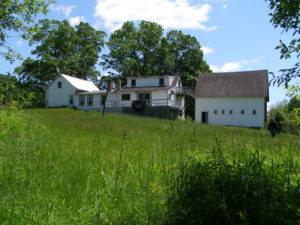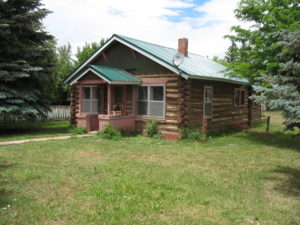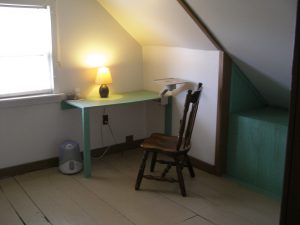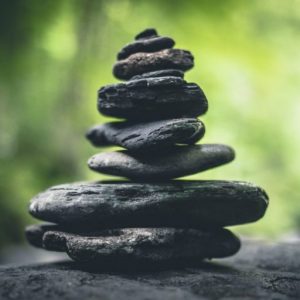by Jenny Rose | Feb 12, 2022 | A Flourishing Woman, The Journey
I’ve written before about rewriting our personal narratives. I’m revisiting the idea, this time in terms of rewriting the past.
Pete Walker’s material on complex post-traumatic stress disorder suggests revisiting old traumas remaining in our memory as painful, nonhealing wounds, and rewriting. He talks about it in terms of time travel. One goes back, as an adult, into memories of childhood and enters the scene as a new character, creating a new and different narrative. Our adult selves can defend our child selves, shield them, help them explain themselves, provide comfort to them, and, if needed, remove them before whatever terrible experience occurred.

Photo by Angelina Litvin on Unsplash
Intrigued, I tried this method, and I was shocked, though I know the power of stories, at how well it worked and how much fun it was. Not only has it helped me heal from past trauma, it also strengthens my ability now to automatically stay on my own side and defend myself.
Seth Godin also talks about this concept. His language is “rewriting the script.” Same idea, slightly different presentation. Godin is business oriented, while Walker is psychology oriented.
Godin suggests, instead of saying to ourselves “here we go again,” we simply rewrite the script this time, which means we throw away our expectations and take each experience as a fresh one, rather than another terrible iteration of something in our past.
This is powerful for me as we navigate the process of moving house. I’ve done it more times before than I want to count, and I’ve always found it deeply traumatic, but this time is different. In spite of broken contracts, changing timelines, obstructions and reversals, and the usual financial and physical stresses, I’m managing to stay grounded and balanced. It feels like a rough patch, for sure, but I don’t feel traumatized. I have moments of amusement and even more moments of curiosity. What on earth will happen next? How will this all work out? Where will I be sitting in 6 months?
Old traumas and wounds are just that – old. We don’t have to insist new, similar experiences cut as deeply. It is a choice, although not an obvious one. We could just tear up our old scripts, the ones that hurt us, the ones that never work out for us, the ones filled with fear and heartbreak, and write a new one. Now does not have to be the same as then.
In yet another way to think about this, I came across advice from a writer on how to appreciate one’s progress. She, too, suggested time travel. If we feel stuck and as though we’re making no progress, and never have, and never will, and what person X told us way back when we were children, that we’ll never amount to anything, seems a curse we can never lift, we can sit quietly with ourselves and think back a year, or five, or ten. Stepping back helps us gain perspective and see exactly how far we’ve come, how much we’ve learned, how much we’ve grown. What if we went back, in imagination, to cheer on the self we were a year ago, whispering to them of all the wonderful progress ahead?
Scripts and storylines can be changed. We don’t have to give them our power. It’s so easy to forget that. It takes an act of presence and will to change the script and reclaim our power, but we can let go of our limiting expectations and beliefs and allow ourselves a different kind of experience. Not here we go again, but here’s a new experience – I wonder what will happen?
Sometimes all we need to do is shift our gaze from the hopeless and frightening places where we have no power and focus on the places we do. If we can stay there, rest there, live there, the chaos and tumult, though unpleasant, won’t knock us down and trample us. Such times pass by, pass over without traumatizing us, and we’ll come out on the other side more resilient than ever.

Photo by Leon Liu on Unsplash
by Jenny Rose | Jan 15, 2022 | Connection & Community, Emotional Intelligence
Convenience: The state of being able to proceed with something with little effort or difficulty (online Oxford Dictionary).
It’s a frigid winter morning here in central Maine with a wind chill taking us into double-digit negative temperatures and a big winter storm approaching. I’m wrapped in a blanket, sitting in my attic aerie in the thin winter sunshine, listening to the wind and thinking about convenience.

Photo by Tom Barrett on Unsplash
The weather is inconvenient. I was hoping to load up the car for another trip to storage, but the wind chill is dangerous. Frostbite can occur in 10 minutes at these temperatures. The wind and cold have polished the ice and snow in our driveway to a slippery gloss, unforgiving as concrete. Nothing about the sound of the wind or the house creaking in the cold makes me want to leave my cozy blanket and chair and go out.
I think I’ll have another cup of tea instead.
I’ve never lived in a really old house before I came to Maine. The farmhouse we’re in now is 200 years old, and the house we’re in the process of trying to buy is more than 100 years old. I’ve learned, since I came here, to expect these old places to be less convenient in terms of closet space, ceiling height, finished basements, upstairs heat, and bathrooms than more modern homes.
Without considering it, I’ve always assigned a negative feeling to inconvenience. I read a few sentences from Seth Godin this week that made me think hard about the meaning and implications of convenience.
Looking at the definition above, I immediately notice how subjective it is. What may be entirely convenient for me can be ridiculously inconvenient for someone else, and vice versa. This is a challenge in my primary relationship. My partner cares a lot about convenience – his own. However, our ideas about what’s functional and workable are frequently quite different.
So here’s my first set of questions: where is the line between convenience and laziness? Is there a line? Should there be a line?
Godin opines that people will trade privacy and money for convenience, and I know from my own experience we sometimes behave as if we value convenience over relationships.
That seems wrong to me. Do we really care more about our own convenience – where things are kept, how we manage recycling and trash, how to load a dishwasher, how to position a roll of paper towels or toilet paper, how to iron a shirt – than our relationships?
Have I ever done that?
No, of course not!
Probably.
I have certainly received that message from others: I care more about having it my way than I do about you.
Ouch.
At the other end of the spectrum, I will say without hesitation there are certain “inconveniences” nobody should tolerate. Like being systematically abused or bullied, or ignoring a chronic issue that’s dangerous or a health concern. A car with a broken hatch or door that flies open while driving, for example, is more than an inconvenience.
Do we tolerate those kinds of things because it’s more inconvenient to deal with them than it is to live with them?
Speaking for myself, the answer is maybe. I will, and have, and do, tolerate constant small inconveniences because I value relationship more than my own comfort (not necessarily a healthy thing, especially when unreciprocated), and I find conflict and tension so unbearably inconvenient. I’d rather deal with my slow accumulation of resentment than stand up for what I find convenient in the context of a relationship and risk friction.
As I said, convenience is so subjective it’s hard to get on the same page in terms of discussing it. Convenience works in the shadows. We don’t talk or think about it directly. How many unconscious decisions a day do we make in an effort to make our busy, noisy lives more convenient, never counting the cost to ourselves or those around us?

Photo by Nabeel Syed on Unsplash
The cost of convenience. Not only monetary cost, but time, energy, social, environmental costs. Cars are indispensable for most of us. If we don’t have our own, we have access to some kind of mass transit. But we pay for our cars, and the planet suffers for them. Plastic is unbelievably convenient. It’s also choking the planet to death.
Convenience is a moving target. Having to walk through a big house to the one bathroom is not as convenient as an en suite bathroom, but it sure beats having to go out to the outhouse! When do we have enough convenience? When are we satisified with our privileges?
At what point have we taken convenience too far? How do we persuade ourselves and others to accept something more inconvenient but healthier and more sustainable for everyone, including the planet?
Undeniably, our search for more convenience has motivated countless amazing technological and design breakthroughs. Our desire for convenience can fuel our adaptability and resilience, our creativity, and underpins movements like minimalism.
But are we entitled to demand ever-increasing convenience from the world and those around us? Do we have a right to encounter no difficulty, have to make no effort?
Absolutely not. Because our convenience may be creating inconvenience for someone else, which they may or may not express. For me, this boils down to what I’ve learned about needs: My needs are as important but not more important than anyone else’s.
My convenience is as important but not more important than anyone else’s. None of us can escape others, not in this crowded world. And that means we’re all going to encounter difficulty and we’re all going to have make an effort, whether it’s convenient or not. Inevitably, some of us will make more effort than others, and it’s up to those hard-working people (emotional labor, anyone?) to refrain from enabling others in a quest for total convenience.
Perhaps inconvenience, like discomfort, is not negative at all. Maybe it shapes us in powerful, positive ways, helping us stay creative and flexible, reminding us to stay present with our true priorities and whether our actions reflect them.
Sometimes we’re going to have to change our plans to accommodate the weather.
Sometimes we’re going to have to walk through a couple of rooms or down the stairs to use our bathroom.
Sometimes we’re going to have to deal with the inconvenience of other people or pets.
We can choose convenience over all the rest. We can. But, as Godin reminds me, some things, and some people, are worth a little inconvenience. Or even a lot.

Photo by Aaron Burden on Unsplash
by Jenny Rose | Jan 8, 2022 | A Flourishing Woman, The Journey
All my life I’ve felt traumatized by how frequently I’ve moved house. My general insecurity makes uprooting myself a fearful ordeal.

Maine Farmhouse and Barn
This time, as we go through the process of selling this old farm and searching for a new place, I’m realizing for the first time how valuable my experience of moving is. My resentment about it is falling away.
I know most people approach finding a new home from the will-this-place-suit-me direction, and that’s probably practical and sensible. I can and have done that many times, but I also spend a lot of time thinking about whether I will suit the new place, and being curious about how I might fit my life into it rather than forcing it to accommodate me.
I do this because, as I’m realizing now, every place I’ve lived has changed me, challenged me, and shown me new aspects of myself. I’ve never had much money and therefore been unable to have a wide choice or completely renovate, so I’ve learned to adapt and adjust to wherever I am. For the first time in my life, I’m seeing what strength and power lie in that kind of resilience.
I’ve lived in homes, apartments, dorms, a trailer, a log cabin, and my parents’ home (as an adult). I’ve rented and I’ve owned, bought and sold, and been a landlady. I’ve lived with husbands, my kids, assorted animals, and friends. I’ve lived by myself. I’ve lived in large places with ample storage and closets and small places with one closet in the entire house.

Now, as I approach my 60s, I think I know a lot about what I need, what’s important, and how adaptable I am. Of course, I thought that at 50 when I came to Maine, but this old farmhouse taught me a great deal more. And the new house will teach me yet more. During my time in this house, I also became a minimalist, which has had a huge impact on my priorities and the amount of stuff I manage.
Leaving the place I know, no matter what this house’s challenges, is hard. I am, at least, familiar with the current problems and challenges. But I also know what I love; I’m already grieving the loss of this beautiful 26 acres, the gardens, the wildlife, the views out the windows, the way the sun comes into my little attic aerie, and the shrill spring song of the peepers in the pond.
I realize, however, that the next place I live will present me with new joys. I don’t know what they will be. They won’t be exactly like what I’m leaving. But a new space holds new possibilities and new discoveries, along with fresh challenges.
The thing about limits and challenges is the opportunity they hold. I’m excited by the prospect of creatively solving problems I encounter. One of the good things about having little financial resource is that I’ve been forced to rely on creative, low-cost solutions. If one doesn’t have money to throw at problems, one has to find another way.
Finding another way has always been a journey worth taking for me, a journey into my own power, ability, and creativity. Without the help of abundant money, it can seem like a long, slow, journey, uncomfortable and occasionally even tortuous, but filled with discovery and satisfaction. The new space and I will work together to make something functional and beautiful. We’ll find out about one another. We’ll take care of one another.
We’ll make a new home together.

Jenny’s attic is waiting for her. Fall, 2014
by Jenny Rose | Nov 25, 2021
THE WEBBD WHEEL OVERVIEW & EXCERPTS This extraordinary body of work breaks new ground and crosses genre lines. Part fantasy, part science fiction, part systems science, part women’s studies, and wholly fascinating, it’s a complex tapestry of characters and stories...
by Jenny Rose | Nov 7, 2021 | A Flourishing Woman, The Journey
A frequent conversation among my coworkers at our rehab pool facility, as well as our mostly middle-aged and older patrons and patients, has to do with the unexpected places life takes us. How did we get here from there?

Photo by yatharth roy vibhakar on Unsplash
For some this is a bittersweet question, for others an amusing one, and for others a bewildered or even despairing one. Whatever our current reality is, none of us could have foreseen or imagined it when we were young adults.
We can all talk about dreams we’ve had, intentions, hopes, and choices we’ve made in pursuit of the life we imagined we wanted, but life itself is always a wild card. It picks us up by the scruff of our neck, sweeps us away, and casts us onto strange shores.
As I age and practice minimalism, I realize keeping my dreams flexible has never been more important. My dreams, along with everything else, change. What I longed for as a young woman is not what I want now. What I needed in midlife is not what I want as I approach my 60s. Some things I’ve thought of as merely desirable are now essential, and other things I thought I needed no longer seem important.
In some ways I like dancing with change, my own as well as external circumstances. It feels dynamic and healthy. Resilience and adaptation are strong life skills.
In other ways it’s hard, the way my needs and I change. Often, I feel my own natural change and growth are hurtful to others. I try to hold them back. I try to stop myself, make myself quiet and small so no one will be upset, including me!
In the end, though, there’s something in me that’s wild, and sure, and deeply rooted in the rightness of change. It can’t be silenced or stifled, and there’s no peace for me until I begin living true to myself once again, no matter the cost.
The costs are very high. The personal costs of living authentically have been catastrophic for me. Sometimes I feel I’ve paid with everything I ever valued.
And yet the power of living authentically, the peace of it, the satisfaction of shaping a life that really works and makes me happy … How much is too much to sacrifice for that?
For a long time, I’ve thought about balance. Financial balance. Work-life balance, which is a term so nonspecific as to be useless. Balancing time. Balancing socialization and solitude. Balancing sitting and writing with physical activity. The complex balance of give and take in relationships. Balancing needs and power.
Minimalism is about balance. Achieving a simple life demands balance, something hard to find in an overcrowded life. Practicing simplicity and working toward balance take mindfulness, which is a difficult skill to hone in our loud, distracting, manipulative and addictive consumer culture. There’s a lot of social pressure to want more and bigger, to hang on tightly to our things.
But I want less. I want less stuff, less expense, less noise (visual and otherwise), less maintenance, less complication. I want less because I want more. I want more peace, more beauty, more sustainability, more time for loved ones and the activities that are most important to me. Gardening. Animals. Walking. Writing. Playing. Spiritual practice.
I don’t want more than I need. I don’t need more than I can use, enjoy, take care of, or pay for.
I do want to accommodate change, my own, and changing circumstances around me. The simpler and easier my life is, the more space I have to welcome my own aging and wherever my life journey takes me next. I don’t make myself crazy trying to anticipate all the future possibilities, but I want to know I can live well with the resource I have and build reserves for whatever the future brings.
Ironically, it often takes resource to go from more to less. Financial resource. Time and energy resource. It takes sacrifice, in the sense of being willing to give up things valued for the sake of things even more valuable and worthy. In its own way, moving in the direction of living simply is as much work and emotional cost as the endless treadmill of more. It does have an end point, though, whereas more is never satisfied.
Last week I read a post from Joel Tefft titled ‘Abandon, Embrace‘. He suggests daily journaling (which I also highly recommend) using the writing prompts: Today I abandon ___ and today I embrace ___. This is balance in action. What is not helping? What is most important? Abandon something in order to make space for something better.
We can’t find a place for what’s most important if our cup is already too full.

Photo by ORNELLA BINNI on Unsplash
Deciding what kind of a life we want to live and working to create it is a difficult process of choice. It’s difficult because it can be so hard to tell the truth about our needs and feelings. Sometimes we have to give up on cherished dreams and hopes, come to terms with our current limitations. Our choices can affect others in hurtful ways. Sacrifice is not easy. Managing our feelings is not easy.
Choosing, as I’ve said before, involves consequences we can’t always control.
But to make choices, especially difficult ones, is to be standing in our power, as is creating an authentic life that allows us to grow deep roots and be the best and happiest we can be, for ourselves, for our loved ones, and for the world.










